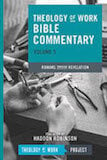Doers of the Word: Working for Those in Need (James 1:22–27)
Bible Commentary / Produced by TOW Project.jpg)
This brings us to the second principle of faithful work—working for the benefit of others in need. “Be doers of the word, and not merely hearers who deceive themselves” (James 1:22). This principle follows naturally from the principle of trusting God to provide for our needs. If we trust God to provide for our needs, then it frees us to work for the benefit of others. On the other hand, if our trust in God does not lead us to act for the benefit of others in need, then James suggests that we don’t really trust God. As James puts it, “Religion that is pure and undefiled before God the Father is this: to care for orphans and widows in their distress” (James 1:27). Belief means trust, and trust leads to action.
The source of James’s insight seems to be Jesus himself, especially his teachings about the poor and the practical care he showed to a variety of marginalized people. This can be seen, for example, in James’s allusions to Jesus’ teachings regarding the special place of the poor in God’s kingdom (James 2:5; Luke 6:20), along with Jesus’ warnings about rotting treasures “on the earth” (James 5: 1–5; Matt. 6:19).
This has direct application to work because meeting needs is the number one mark of a successful workplace, whether in business, education, health care, government work, the professions, nonprofits, or others. A successful organization meets the needs of its customers, employees, investors, citizens, students, clients, and other stakeholders. This is not James’s primary focus—he is focused particularly on the needs of people who are poor or powerless—but it nonetheless applies. Whenever an organization meets people’s true needs, it is doing God’s work.
This application is not limited to serving customers in established businesses. It requires even greater creativity—and demonstrates God’s provision even more—when Christians meet the needs of people who are too poor to be customers of established businesses. For example, a group of Christians started a furniture factory in Vietnam to provide jobs for people at the lowest level of the socioeconomic spectrum there. Through the factory, God provides for the needs of both overseas customers needing furniture and local workers who were previously unemployed.[1] Similarly, TriLink Global, an investment firm led by Gloria Nelund, helps start businesses in the developing world as a means to meeting the needs of poor and marginalized people.[2]
Christians’ duty does not end with serving the poor and needy through individual workplaces. Social structures and political-economic systems strongly affect whether the needs of the poor are met. To the degree that Christians can influence these structures and systems, we have a responsibility to ensure that they meet the needs of poor and needy people, as well as the needs of rich and powerful people.








